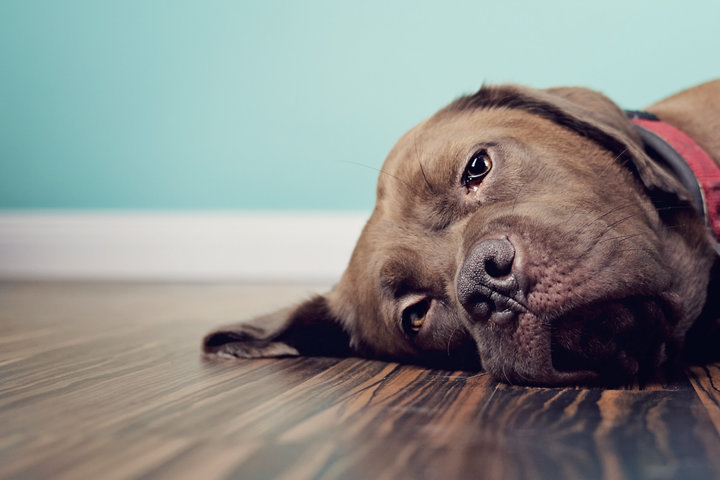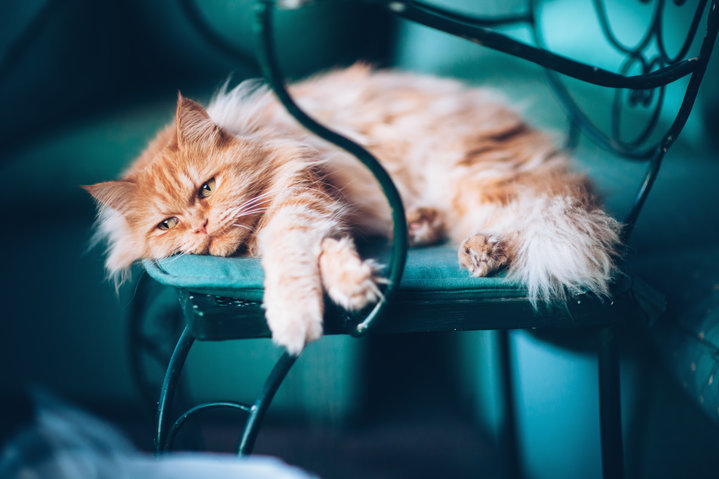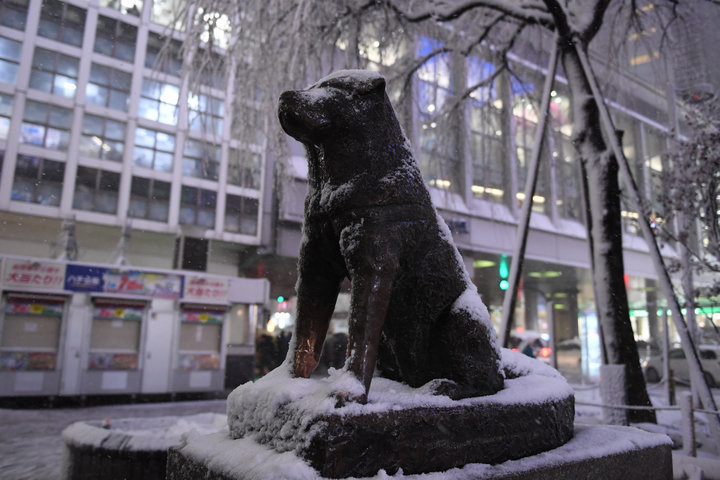Pets Can Experience Grief

Here’s What You Should Know About It
How to help your pet get through a period of loss.
By Caroline Bologna 07/20/2018
How to help your pet get through a period of loss.
By Caroline Bologna 07/20/2018

“Pets can grieve to varying degrees when they lose a human or animal companion,” said Kate Mornement, an animal behaviorist and consultant.
One of the most poignant examples of pet-human relationships might be the tale of Hachikō,
an Akita that was born in Japan in the 1920s. He left his house to greet his owner at a Tokyo train station every evening and continued to
do so for nearly a decade after the man died.

The Hachikō statue outside Shibuya Station in Tokyo. He left his house to greet his owner at the station every evening and continued to do so for nearly a decade after the man died.
Over the years, similar stories have made headlines around the world - from Ecuador to Russia to China - and people are moved by these accounts of pet loyalty, devotion and grief.
Though some have cast doubt
on the reality of pet mourning, many animal experts believe that pets experience grief after the death of a person or animal they were close with.
“Pets can grieve to varying degrees when they lose a human or animal companion,” Kate Mornement, an Australian animal behaviorist and consultant, told HuffPost. “Our understanding of this used to be anecdotal, but now we have scientific evidence of grief in both cats and dogs.”
In addition to cats and dogs, people have observed grief in other common pets like rabbits, horses and birds.
Of course, not all pets grieve, and the ways in which they mourn vary from individual to individual. Still, there are some common signs of grief. In many cases, they behave the way grieving humans do, according to Marc Bekoff, a professor emeritus of ecology and evolutionary biology at the University of Colorado at Boulder and the author of Canine Confidential: Why Dogs Do What They Do.
“In general, an individual might stop eating or eat less, stop playing, mope around looking for their friend ― walking slowly, head low, tail down, for example - and simply seem distracted and not interested in doing much,” he said. “One of the dogs with whom I shared my home went from being a hyperplayful social butterfly and nonstop eater to a laid back and lethargic dog who stopped eating for two days after his dog friend died.”
Mornement echoed Bekoff, saying that behavioral changes are the most obvious signs of grief in pets.
“Grieving pets may lose their appetite, constantly check the places their companion used to sleep and relax, solicit more attention and affection, whine or meow more and sleep more than usual. Cats and dogs actually grieve in a very similar way,” she said.
Still, we can’t fully equate human and pet responses to loss. Bekoff said the dog in his home
began exhibiting normal behavior again after only about four days.
Kirstin McMillan,
a third-generation animal trainer based in Los Angeles, told HuffPost that animals that experience loss and grief more tend to be those with
complex social structures like primates, elephants and dogs.


In the case of dogs, the level of grief can vary, depending on how bonded a dog was to the person or fellow animal that died. Littermates or dogs that have been with the deceased individual from puppyhood are more likely to go through withdrawal.
“The dog acts sad. They’ll mope around the house and have a sad look on their face,” she said. “Their energy is pale and gray, as opposed to vibrant and lively the way a dog should be. They won’t play as much.”
Because many senior citizens are retired or widowed, they tend to spend a lot of time with their dogs, McMillan added. As a result, these pets may feel the loss more deeply. “It’s like that dog’s whole world is taken away,” she explained.


In the case of cats, grief can manifest in similar ways. “They can withdraw, they can take it out on a companion cat, or they can be aggressive with their caregiver,” Carole Wilbourn, a cat therapist based in New York, told HuffPost, adding that cats have been known to stop eating or become destructive after a loss.
“They can also get ill. Maybe all the tension will well up in their bladder, and they’ll start not using the litter box,” she added. “A lot of separation anxiety can really build up so that a behavioral or emotional
issue can trigger a medical problem. Or if they already had an existing condition, that could intensify.”
For people looking to help a pet get through grief, there are a few possible approaches.
Wilbourn said she tells cat owners to focus on nurturing themselves through the loss and work to create a healing and happy atmosphere for their pets.
“Frequently,
a cat will mirror their person’s feelings and actions. You don’t have to necessarily pretend you aren’t feeling sad, but also do things to make yourself feel better, like play music, take a bubble bath, do yoga or meditate,” she suggested.
Wilbourn also recommended telling the
cat that everything is going to be OK. “I’m not saying the cat
understands words, but they pick up the body language and tone of
voice,” she said.
McMillan said much of pet grief has to do with the routine rather than particularly deep-seated emotions.
“What I do is flip the animal’s routine on its head,” she said. If every morning before the loss, a dog had breakfast first, then hung out at home and then went for a walk, she does something different. Instead, she’ll take the dog on a walk first on a completely different path from what it’s used to and then take it back and give it breakfast in a different part of the house. And then rather whatever it would normally do after breakfast, she’ll take it to do something else.
“That way, the routine is different,” she said. “The space the other animal or person holds in the dog’s heart is oriented around a routine. So when you change the routine, they’re going to feel the absence of that dog or that person less. It’s not going to erase it, but they’re going to feel it less.”
v
McMillan pointed to the Hachikō story as an example of the power of routine. “That’s why you flip the routine on its head, to help the dog be in the now,” she said. “You want to rally the dog, encourage it to go forward and build a new life. Animals are resilient by nature, so you want to build on that.”
If your dog lost a fellow dog companion, she also recommended getting a new dog bed so that
the smells aren’t there as a reminder. Another important thing is to let your pet be with the dead animal, if possible.
“If you’re putting one of your animals down, let the other animal be there if you have the opportunity to do that. Let your other animal be there and sit with them and smell the body of the animal that has passed away. They will register death,” she said. “I encourage the same thing if they’ve lost a person, if there’s that opportunity. That way they’re not
thinking, ‘Where did they go?’”
Ultimately the most important thing for helping a pet get through a loss is just being there.
“People can help their pets through the grieving process by being there for them and spending time with them,” said Mornement. “The passage of time will help to ease grief. However, engaging in activities your pet enjoys, such as walking or playing can also help. Losing a much-loved companion can be a big adjustment, and showing some extra care and compassion towards a grieving pet will help pets transition to life without their companion.”
Bekoff said, “Love them, comfort them,calm them down, make them feel safe and secure and let them know you care for them and love them and are there to support them.”
Not all pets grieve, and the ways they mourn vary, depending on each animal.
Grieving pets can lose their appetite, and their energy level can drop.


1 comment:
Thank you for sharing. I know how painful to experience the loss of a pet. You can't explain the pain. and how hard to accept it. After the pet cremation services seattle of my dear pet, I understand the process of grief.
Post a Comment